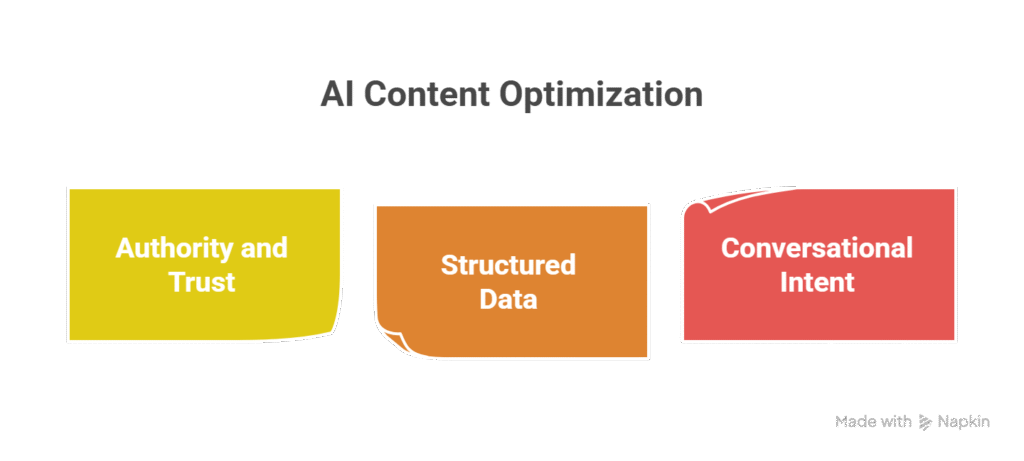Table of Contents
I. Introduction: A New Era of Search
For over two decades, Google has been the go-to gateway to the internet. Its iconic “10 blue links” shaped how billions of people discovered information—through keywords, ranking algorithms, and organic results. But in 2025, that familiar model is rapidly being replaced by something more dynamic, more intuitive, and far more intelligent.
Today’s search experience is no longer about combing through pages of links. With the rise of conversational AI tools like ChatGPT, Perplexity AI, and Bing’s Copilot, users are engaging in real-time dialogues with systems that understand nuance, context, and complexity. These tools don’t just point to information—they deliver it, summarized, personalized, and ready to act on.
📊 “13% of all Google queries in March 2025 now trigger an AI Overview,” according to a Semrush report—one of the clearest signals yet that AI-generated answers are shifting the center of gravity in how we find information.
The shift isn’t just technological—it’s behavioral. We’re no longer typing in keywords; we’re having conversations. And in that shift, the very function of “search” is being rewritten.
II. The Shift in Search Behavior: From Links to Answers
A. The Death of the 10-Blue-Links Model
For years, search engines operated like curated directories. You’d type a query—say, “best exercises for lower back pain”—and receive a list of links, often requiring you to click, scan, compare, and repeat.
AI-powered tools have ended that era.
Platforms like ChatGPT and Perplexity AI now generate direct, synthesized responses to complex queries. Instead of wading through SEO-optimized blog posts or forums, users receive concise, conversational answers built from multiple sources. These systems distill the signal from the noise, helping people get what they need faster and with fewer clicks.
Example: Ask ChatGPT, “Plan a 3-day Istanbul itinerary with food recommendations,” and you’ll get a structured plan—morning to night—plus local dishes to try. No tabs, no endless scrolling, no bouncing between travel blogs.
The result? Efficiency. Clarity. And for many, trust in AI to provide the “best” answer, not just the “most popular” one.
B. AI as Your Research Assistant
Search tools used to help you find answers. Now they help you do things.
Modern AI search agents go far beyond basic fact-finding. They can:
- Summarize scientific papers or articles in seconds
- Compare complex product specs across brands
- Draft itineraries, plans, emails, and outlines
- Help code, debug, or explain technical concepts
Instead of being a starting point, search is becoming an endpoint—a full-service assistant that handles the cognitive heavy lifting. With integrated tools like You.com’s AI Studio or Bing Copilot’s productivity suite, users are now able to brainstorm, write, analyze, and execute—all within the search environment itself.
C. Conversational Context Is King
Perhaps the most revolutionary change in AI-powered search is the idea of context retention. Traditional search is static: each query stands alone. Ask “how to bake sourdough” and then “how long should I let it rest?”—Google treats them as two unrelated searches.
In contrast, AI tools remember the flow of conversation. You can ask follow-up questions, clarify, or pivot, and the AI retains prior context to give better, more relevant answers. It’s the difference between googling and talking to an intelligent assistant.
This creates an environment where search evolves as the user’s thinking evolves. It’s not a series of queries—it’s a dialogue. And that makes the experience more natural, satisfying, and effective, especially for complex or unfamiliar topics.
III. What AI Search Does Differently
A. Multimodal, Multi-Input Search
The “type and search” era is quickly being outpaced by multimodal search capabilities. AI search tools in 2025 aren’t limited to processing keywords—they understand and respond to images, documents, voice, and mixed inputs in real time.
Platforms like:
- Google’s Gemini can process screenshots or photos and provide detailed explanations or actions.
- OpenAI’s CLIP model helps ChatGPT understand and respond to image inputs.
- Perplexity AI allows users to upload PDFs or reference visuals to support complex questions.
Example: Upload an image of a skin rash, and Gemini can suggest possible causes, highlight areas of concern, and recommend medical guidance (while linking to verified sources).
This multi-input fluency breaks down barriers between mediums, allowing users to express what they need however it’s most natural—by speaking, showing, or sharing.
B. Personalized, Intent-Aware Answers
AI search isn’t just smart—it’s aware.
Thanks to advancements in machine learning, these tools analyze:
- Your search history
- Behavioral patterns
- Current session context
- Preferred sources and formats
The result is highly personalized output. Ask Perplexity AI for “workout tips,” and a fitness novice will get different suggestions than a seasoned athlete. Over time, AI learns to anticipate needs, fine-tune language, and surface content that feels made for you.
Users report significantly reduced time to find relevant results—and higher satisfaction—compared to traditional search that treats every query as a clean slate.
This level of customization streamlines workflows, minimizes friction, and transforms search from a tool into a smart partner.
C. From Search Tool to Productivity Engine
Perhaps the most transformative shift is that AI search tools are no longer just about finding information—they’re built for getting things done.
Platforms like:
- You.com now include chat-based coding tools, calendar integration, and AI-generated content.
- Bing AI (Copilot) offers writing assistance, summarization, slide creation, and full-suite Microsoft integration.
Users can:
- Plan entire projects
- Draft emails and reports
- Automate spreadsheet tasks
- Code and debug in real time
- Brainstorm or ideate across topics
This evolution makes AI search feel more like an operating system for productivity. You’re not just querying information—you’re building, executing, and iterating with the AI acting as a co-pilot for every digital task.
IV. Google’s Counterattack: AI Overviews & Beyond
A. The AI Overview Rollout
Faced with mounting competition, Google has unleashed its most ambitious update yet: AI Overviews.
- These summaries appear directly above traditional search results.
- They pull data from multiple sources and present it as a single, synthesized answer—complete with citations and contextual follow-ups.
📈 As of March 2025, over 13% of all Google searches now trigger an AI Overview.
The feature has had a significant impact in science, health, and education, where users often seek fast yet reliable overviews. For instance, a query like “What are the latest COVID-19 treatments?” will return a pre-compiled answer, with vetted source links and a quick summary of current recommendations.
B. Google’s “AI Mode” and Multisearch
Google’s pivot goes beyond overviews.
With AI Mode, users can:
- Switch to a fully conversational interface (similar to ChatGPT)
- Ask follow-up questions
- Explore topics in a thread-like flow
In addition, Multisearch blends text, voice, and visual input. Users can:
- Snap a picture of a product and ask for reviews
- Speak a query while referencing an image
- Search within videos or documents contextually
These moves show Google’s attempt to preserve relevance in a world where users expect more fluid, multimodal interactions.
C. Organic Traffic Disruption
While users may enjoy AI Overviews, many publishers and content creators are facing a new crisis: declining visibility.
Reports indicate:
- Click-through rates (CTR) are down as much as 64% for queries now satisfied by AI-generated answers.
- Traffic is shifting away from traditional websites toward AI interfaces that don’t require a click.
This has serious implications for SEO:

- Authority and trustworthiness now matter more than ever—AI agents prefer citing established, credible sources.
- Structured data and semantic clarity are key to being included in AI outputs.
- Content must be optimized for conversational intent, not just keywords.
In essence, AI search has created a new type of “zero-click” internet, where quality content matters—but presentation, structure, and trust signals matter even more.
V. The New Contenders: Perplexity, You.com, and the AI Search Wars
A. Rise of Feature-Rich Alternatives
The once-monolithic search landscape now has serious challengers—and they’re not just clones of Google. Tools like Perplexity AI and You.com are carving out their own niches by focusing on utility, privacy, and seamless productivity.
- Perplexity AI emphasizes citation-backed answers, PDF ingestion, and a sleek, minimalist interface that supports in-depth research and sourcing.
- You.com blends traditional search with a customizable AI assistant, integrating tools like code generation, writing support, and even image editing—all within the same platform.
- Other rising players (like Andi, NeevaAI, and Brave Search) are leaning into privacy-first policies or niche functionality to meet growing user demands.
What sets these tools apart?
- Interface: Cleaner, focused UIs with fewer distractions
- Tool integrations: Built-in workspaces, chat features, and apps
- User control: Transparency, ad-free experiences, and personal data protection
B. The Fragmenting Search Ecosystem
Search in 2025 is no longer a binary choice between Google and Bing. Instead, we’re seeing the rise of mission-specific search tools:
- Academic-focused AI tools for research
- E-commerce search engines optimized for product discovery
- Developer-specific platforms that blend documentation, forums, and AI coding agents
This fragmentation is driven by a desire for efficiency, relevance, and trust. Users now choose search tools based on their goal, not just brand loyalty.
Search is becoming a toolbox, not a monolith—and users are curating their tools accordingly.
C. The Competitive Pressure
The ripple effects of AI search innovation have reached Google’s doorstep.
- For the first time in decades, Google faces real existential pressure to reinvent itself, not just iterate.
- The pace of change—driven by startups and open-source models—is forcing legacy platforms to pivot more rapidly than ever before.
From product updates (AI Overviews, Multisearch, AI Mode) to acquisitions and partnerships, Google’s dominance is no longer guaranteed. The playing field has leveled—and innovation is now the currency of survival.
VI. The SEO Reboot: Winning in the Age of AI Search
A. From Keywords to Conversations
Traditional SEO—centered around keywords and backlinks—is undergoing a fundamental shift. AI tools rely on natural language understanding and semantic relationships, not just keyword matching.
What that means for creators:
- Write like you speak: Natural phrasing is favored by AI models trained on human dialogue.
- Use structured data: Schema.org markup, FAQs, and rich snippets help AI understand and rank content.
- Anticipate follow-ups: Think in terms of user journeys, not just single queries.
SEO in 2025 is about useful, scannable, and structured storytelling—not keyword stuffing.
B. Authority, Not Just Volume
AI search tools prioritize reliable, verifiable sources. That means:
- Clickbait headlines and thin content are actively penalized.
- E-A-T (Expertise, Authoritativeness, Trustworthiness) remains critical.
- Verified authorship, proper citations, and clear information architecture boost visibility.
AI doesn’t just pick what’s popular—it picks what’s trustworthy, especially in fields like health, science, and finance.
Content creators must ask: Would I trust this if I didn’t write it?
C. Adaptive Content Strategies
To be featured or cited by AI agents, content must be usable, flexible, and multimodal:
- Text: Clear, structured writing with rich context
- Images & Charts: Labelled, described, and data-supported
- Video & Audio: Transcripts, summaries, and timestamped highlights
Additionally, consider feeding content into public databases, citations, or platforms AI tools are known to scrape or learn from.
AI search agents don’t just crawl websites—they learn from curated, structured sources.
VII. Final Thoughts: Reimagining How We Learn, Decide, and Explore
The way we seek knowledge has been radically reimagined.
In 2025:
- Search is no longer static—it’s a two-way conversation.
- Users don’t just ask questions—they delegate tasks.
- AI is not just finding answers—it’s helping shape better ones.
This shift is more than technical—it’s cultural. We’re entering an era where human-AI collaboration is the norm, not the novelty. Whether you’re planning a trip, writing a paper, or learning a new skill, your AI partner is right there—understanding, anticipating, and acting.
“In 2025, the question isn’t just ‘What do I want to know?’—it’s ‘How can my AI partner help me get there faster, smarter, and better?’”
VIII. Resources & Further Reading
Curated articles, studies, and tools to explore the evolving world of AI-powered search:
- 📊 [CASE STUDY] Impact of AI Search on User Behavior & CTR in 2025
How AI answers are reshaping user habits and website traffic.
arcintermedia.com - 🤖 Will Google Still Dominate in 2025?
Exploring the rise of AI competitors and Google’s changing role.
LinkedIn – Rahul Patel - 🧠 AI Search Agents vs Google: The Future of Search
A breakdown of how AI agents like ChatGPT could replace traditional engines.
Upskillist Blog - 🦾 AI-powered Search: What You Need to Know in 2025
From Meilisearch: An overview of multimodal, personalized search technology.
meilisearch.com - 🧬 Google’s AI Mode & Multisearch Explained
How Google is pivoting with new tools like AI Overviews.
Google Blog - 📉 Semrush Report: AI Overviews’ Impact on Organic Search
SEO data on how AI summaries affect search visibility and traffic.
semrush.com - 📢 ChatGPT’s Impact on Google Search Traffic
Traffic trends and shifts caused by generative AI tools.
writesonic.com - 🧩 8 AI-Powered Alternatives to Google in 2025
Tools like You.com and Perplexity AI reimagining the search experience.
produkto.io - 🧭 Google AI in 2025: What Businesses Must Know
A guide to adapting marketing and SEO to the new AI search landscape.
Coalition Technologies - 🧾 The Future of SEO in an AI-First World
How structured content and authority shape AI visibility.
seomator.com
FAQ: Navigating the New World of AI-Powered Search
1. How is AI search different from traditional Google search?
AI search tools like ChatGPT or Perplexity don’t just list links—they generate direct, conversational answers, often with sources, summaries, and actionable insights built in. They prioritize user intent and context, rather than matching exact keywords.
2. Will Google still be relevant in the age of AI search?
Yes, but it’s evolving. Google’s AI Overviews and “AI Mode” show it’s adapting by integrating generative AI features. While it still dominates in volume, niche tools are gaining ground quickly in areas like research, planning, and productivity.
3. Are AI search tools more accurate than traditional engines?
They can be, especially for summary-based or contextual queries. However, their accuracy depends on their sources and training data. Many now cite their answers, but for critical topics like health or finance, users should always cross-check with trusted sources.
4. How should content creators adapt to AI search?
Focus on structured, authoritative content optimized for natural language. Use schema markup, emphasize E-A-T (Expertise, Authoritativeness, Trust), and provide content that can be easily cited or summarized by AI tools.
5. What’s the biggest benefit of using AI-powered search tools?
Efficiency. AI search doesn’t just help you find information—it helps you understand it, apply it, and act on it. Whether you’re solving a problem, planning a trip, or learning something new, it turns search into a conversation—not just a query.





[…] Read More: AI Search Revolution 2025: How ChatGPT Is Killing Google (And Why You Should Care) […]
[…] AI Search Revolution 2025: How ChatGPT Is Killing Google (And Why You Should Care) […]